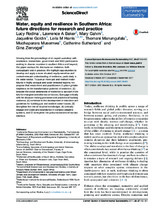Water, equity and resilience in Southern Africa:future directions for research and practice
Abstract
Today, resilience thinking is prolific across a range ofresearch fields and global policy domains, serving as abridge between social and environmental sciences, andbetween science, policy, and practice. Resilience, in itsbroadest sense, refers to the ability of systems or societiesto cope with shocks, stresses and change, whether bypersisting or by adapting and transforming [1 ]. Earlywork on resilience used the term to describe, or measure,of the ability of systems to absorb change [2] — a notionthat has since evolved. Today, resilience thinking iswidely used as an approach to deal with complex adaptivesystems dynamics and their inherent uncertainty, pro-moting learning to live with change as an opportunity [1 ].The ability to adapt and transform in the face of change isoften considered a key aspect of resilience thinking [1 ] atthe conceptual level, while in practice the question ofwhat constitutes fundamental change and how to achieveit remains a topic of research and ongoing debates [3].Another key dimension of resilience thinking is dealingwith uncertain risks associated with climate changeimpacts or other complex system interactions in theAnthropocene and, as such, resilience thinking is oftenconcerned with how societies and biophysical systems cannot only persist, but also thrive in the face of disturbance,both anticipated and unknown [cf. 4].

